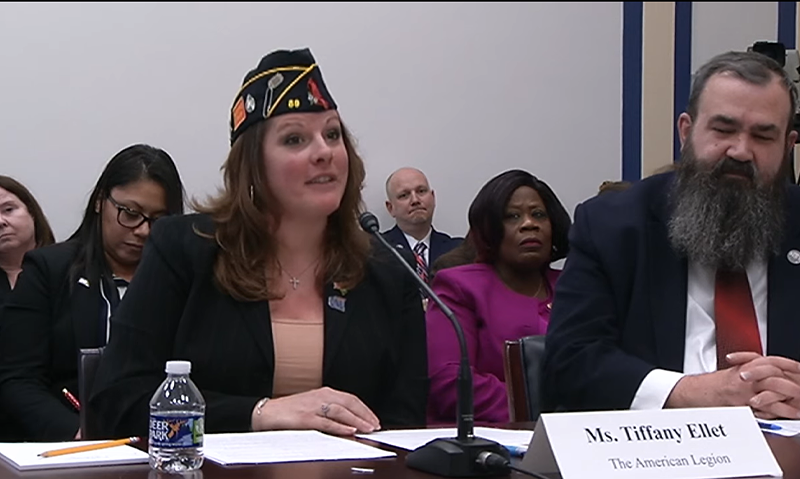
American Legion addresses VA appointment scheduling, patient advocate care and caregiver support.
Tiffany Ellett, director of the American Legion Veterans Affairs & Rehabilitation Division, presented testimony before the Subcommittee on Health Committee on Veterans’ Affairs Wednesday, March 29, on American Legion-supported pending legislation.
“I sit before you today as a disabled veteran, a VA patient and a veteran advocate,” said Ellett, an Army veteran. “It is through this lens that I am able to see what our members see, to feel the frustrations and aggravation they exude when discussing obtaining an appointment, navigating the system and receiving appropriate care.
“The American Legion supports VA as they continue to evolve, we also call upon Congress to pass legislation such as these, to allow for and encourage VA’s evolution towards health equity for veterans.”
In her testimony on behalf of The American Legion, Ellett addressed three pieces of pending legislation supported by The American Legion.
H.R. 41 – VA Same-Day Scheduling Act of 2023. This bill will ensure that a veteran enrolled in VA healthcare is able to schedule an appointment the same day they call a VA medical facility. Ellett said while the VA has made changes to appointment scheduling through its website, healthcare facilities and updated internet applications, veterans still face difficulties scheduling an appointment. By phone, many veterans successfully obtain an appointment while others may go weeks without a follow-up. She shared that the Dorn VA in Columbia, S.C., has a pilot program where scheduling is in a single sign-on interface. “In this one screen, the scheduler can see all open appointment times and days for not only the VA provider but also for the community care provider to which the veteran was referred. With this type of system, scheduling an appointment takes an average of about seven minutes, which is ideal for simplifying the scheduling needs of a veteran.”
Ellett shared she and her veteran wife receive VA care in the Richmond area. Following her oral remarks, she was asked if they both have problems getting access to community care.
“Yes and no,” she responded. “When we do schedule with our CBOC, it’s immediate. We can call and schedule an appointment; it’s the community care appointments that have the real problem with the same-day scheduling.”
Through Resolution No. 14: Access to Care, 5 The American Legion supports this legislation.
H.R. 808 – Veterans Patient Advocacy Act. This legislation would ensure that there is at least one patient advocate for every 13,500 veterans enrolled in the VA medical center catchment area. It could also expand support for veterans in rural areas, allowing them more access to advocates through community-based outpatient clinics.
“With the increase of veterans enrolling in VA care, the patient advocates have a heavy workload and at times are not able to assist veterans to the extent needed,” Ellett said. “The American Legion supports the Veteran Patient Advocacy Act and the improvements it will bring through establishing a standard of at least one advocate per 13,500 veterans. We also are encouraged to see an increase in access to patient advocates for veterans in rural communities. The availability of patient advocates is a priority of The American Legion and will continue to be a focal point when speaking with veterans about their representation as a VA patient.”
Through Resolution No. 75: Department of Veterans Affairs Rural Health Care Program and Resolution No. 377: Support for Veteran Quality of Life, The American Legion supports this legislation.
H.R. 542 – Elizabeth Dole Home-and Community-Based Services for Veterans and Caregivers Act of 2023. This legislation aims to improve caregiver support at VA by establishing a publicly centralized access portal, expanding home-based community services nationwide, and providing greater access to resources and guidance on services supporting caregivers and their families.
“Often caregivers will put their veteran’s health and care above their own, leading them toward poor health and burnout. The American Legion is pleased to see that respite care is addressed in this legislation as it is beneficial to caregivers, their families and the veterans they care for,” Ellett said. “We are also pleased to see consideration given to caregivers in terms of support services and education on possible benefits and agree that successful transitions in care are critical to the overall well-being of both the caregiver and the veteran.”
Through Resolution No. 20: Home and Community-Based Services and Veteran Choice to Age in Place, Resolution No. 18: Comprehensive Supports for Caregiver Support Program and Resolution No. 24: Caregiver Program, The American Legion supports this legislation.
Other Legion-supported legislation includes:
H.R. 1089 – VA Medical Center Transparency Act. The American Legion believes it is imperative for VA to maintain oversight and implement accountability on all methods of care provided through the VA healthcare system to ensure the needs of the veterans are met in a supportive, safe and accepting environment. Through Resolution No. 16: Department of Veterans Affairs Accountability and Whistleblowers Protections, The American Legion supports this legislation.
H.R. 754 – Modernizing Veterans’ Health Care Eligibility Act. This legislation will establish an advisory commission regarding eligibility for healthcare furnished by the Secretary of Veterans Affairs. Through Resolution No. 74: Amend the Eligibility Requirements and Extend the Eligibility Time Period for Service-Disabled Veterans Insurance, The American Legion strongly supports establishing a bipartisan advisory commission and would welcome the opportunity to work with and on it.
H.R. 693 – Veterans Affairs Medical Center Absence and Notification Timeline (VACANT) Act. Under this legislation, the VA would establish and report a timeline for and reasoning behind the movement of a facility director. Through Resolution No. 115: Department of Veterans Affairs Recruitment and Retention, The American Legion supports legislation that addresses the recruitment and retention challenges at VA.
- Legislative

